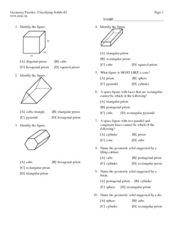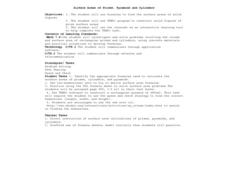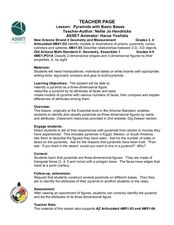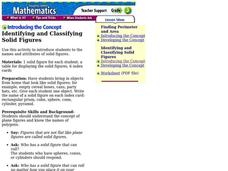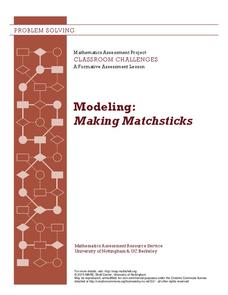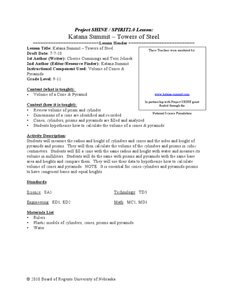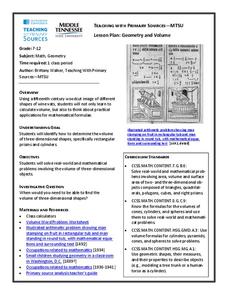Curated OER
Prisms, Pyramids, and Nets
Students compare and contrast the characteristics of prisms and pyramids. In groups, they are given different colored construction paper to make rectanglar prisms. They identify the shapes of the faces and record the number of faces,...
Curated OER
Geometry Practice: Classifying Solids #2
In this solids worksheet, young scholars identify the characteristics of solids. They name solids and determine the number of faces. This three-page worksheet contains seventeen problems. Answers are listed on the last page.
Curated OER
Surface Areas of Prisms, Pyramids and Cylinders
Students identify and use appropriate formulas to find surface areas of solid figures, practice using formula sheet to solve textbook problems, construct solid figures of given surface area using TABS+ software program, and use Internet...
Curated OER
Volume and Surface Area of Right Rectangular Prisms
Middle schoolers identify the formulas for three-dimensional figures. They use manipulatives to model problems. Students create foldables and explain volume and surface area. Middle schoolers complete worksheets and classify solids. ...
Curated OER
Living in a Geometrical World
Students participate in a series of hand-on, online, and multimedia activities to examine 2 dimensional and 3 dimensional shapes. They describe common geometric solids. They construct rectangular prisms using straws and ribbon.
Curated OER
Sketching Pyramids
Young scholars sketch and identify properties of pyramids. In this geometry lesson, students create nets to identify three dimensional shapes. They sketch cones, prisms and pyramids.
Curated OER
Pyramids & Prisms: Guler's Formula
Sixth graders compare and contrast two-dimensional shapes to three-dimensional shapes. After watching a demonstration, they make their own shapes using nets printed on paper. To end the activity, they use the shapes they made and...
Curated OER
Classify Prisms
Students classify prisms according to their attributes. In this classifying prisms lesson, students explore different prisms. Students generate observations of the attributes and classify the prism correctly.
Curated OER
Learning About Volume
Learners explore the concept of volume. They develop formulas for volume of prisms. Then use their formulas to find missing dimensions of various prisms such as height, length, width, radius, and diameter.
Curated OER
Volume Worksheet I
For this volume worksheet, students recognize three-dimensional figures, identify the proper volume formula, and then solve the equation by inserting information from a diagram into the formula. Students solve six equations.
Curated OER
3-D Attributes
Students explore geometric solids. In this geometry instructional activity, students listen to the book The Greedy Triangle by Marilyn Burns, then work in groups to sort geometric solids into various categories. Students define geometric...
Curated OER
Pyramids with Basic Bases
Students explore pyramids. In this math lesson, students discuss where they have seen examples of pyramids. Students classify pyramids as three-dimensional figures and identify their attributes.
Curated OER
More Prisms/Nets
Young scholars calculate the volume and surface are of three-dimensional shapes. In this geometry activity, students use the nets to prove their calculations of shapes. They identify the different parts of a solid using the nets.
Curated OER
Classifying Pyramids
Students study pyramids. In this prisms lesson, students explore the attributes of pyramids. Students will explore the lateral surface area of pyramids and be able to distinguish pyramids from other space shapes.
Curated OER
Sketching Prisms
Students sketch and create nets of different polygons.In this geometry lesson, students differentiate prisms from other three-dimensional shapes. They define the properties of prisms.
Curated OER
Shapely Figures
Students are given magazines, scissors, glue, and one sheet of construction paper. They look for pictures showing real life representations of rectangular prisms, spheres, cones, and pyramids. Pupils cut out pictures showing each of...
Learner
Solid Shapes
A collection of two lessons, kindergartners will identify two-dimensional shapes in solid shapes. They will develop basic knowledge of the components that make up a sphere, rectangular prism, pyramid, cylinder, cone, and cube. Young...
Illustrative Mathematics
3-D Shape Sort
From the apple on your desk and the coffee cup in your hand, to the cabinets along the classroom wall, basic three-dimensional shapes are found everywhere in the world around us. Introduce young mathematicians to the these common figures...
Curated OER
Identifying and Classifying Solid Figures
Students identify solid figures. In this classification lesson, students recognize and name solid figures. Students identify which figures contain polygons and rectangles. Students practice counting vertices, faces and edges.
Curated OER
Identifying and Classifying Solid Figures
Young scholars identify and classify solid geometric figures. In this geometry lesson, students bring in objects that look like solid shapes and identify their attributes. Young scholars identify the number of surfaces and faces on each...
Mathematics Assessment Project
Modeling: Making Matchsticks
Math: The only subject where the solution to a problem is seven million matches. Young scholars first complete an assessment task estimating the number of matches they can make from a tree of given dimensions. They then evaluate provided...
Curated OER
Yummy Shapes
Students explore space shapes learning about edges, corners, and faces. They enjoy shape soup as a culminating activity.
Curated OER
Towers of Steel
This lesson starts with geometers discussing how to find the volume of a cone and pyramid, using what they know about the volume of a cylinder or prism. Then, using the formulas, they calculate the volume of cones and other conics using...
Virginia Department of Education
Geometry and Volume
The history of math is fascinating! Utilize a woodcut primary source image from 1492 and posters from the 1930s to help geometers apply their volume-calculation skills to real-life questions.



